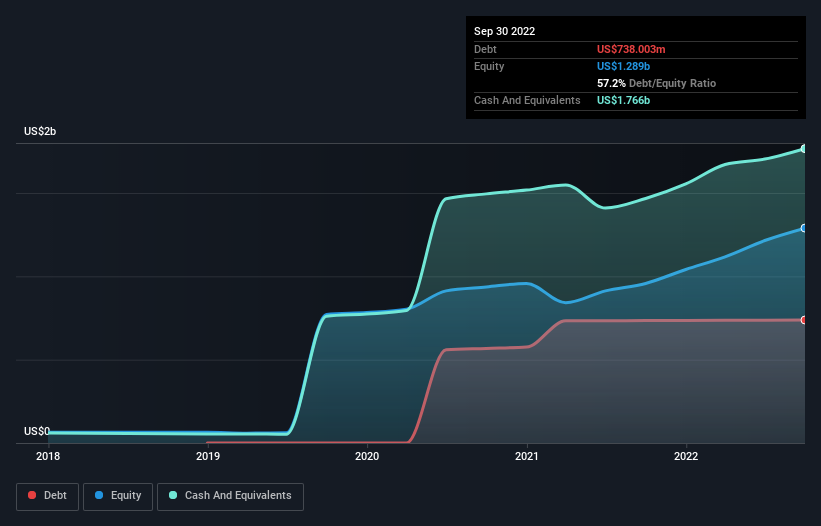
Some say volatility, rather than debt, is the best way to think about risk as an investor, but Warren Buffett famously said that 'Volatility is far from synonymous with risk.' When we think about how risky a company is, we always like to look at its use of debt, since debt overload can lead to ruin. We note that Datadog, Inc. (NASDAQ:DDOG) does have debt on its balance sheet. But should shareholders be worried about its use of debt?
When Is Debt Dangerous?
Debt is a tool to help businesses grow, but if a business is incapable of paying off its lenders, then it exists at their mercy. If things get really bad, the lenders can take control of the business. However, a more usual (but still expensive) situation is where a company must dilute shareholders at a cheap share price simply to get debt under control. Having said that, the most common situation is where a company manages its debt reasonably well - and to its own advantage. When we think about a company's use of debt, we first look at cash and debt together.
View our latest analysis for Datadog
What Is Datadog's Net Debt?
As you can see below, Datadog had US$738.0m of debt, at September 2022, which is about the same as the year before. You can click the chart for greater detail. But it also has US$1.77b in cash to offset that, meaning it has US$1.03b net cash.

How Healthy Is Datadog's Balance Sheet?
According to the last reported balance sheet, Datadog had liabilities of US$674.4m due within 12 months, and liabilities of US$833.8m due beyond 12 months. On the other hand, it had cash of US$1.77b and US$348.8m worth of receivables due within a year. So it can boast US$606.9m more liquid assets than total liabilities.
This short term liquidity is a sign that Datadog could probably pay off its debt with ease, as its balance sheet is far from stretched. Succinctly put, Datadog boasts net cash, so it's fair to say it does not have a heavy debt load! The balance sheet is clearly the area to focus on when you are analysing debt. But ultimately the future profitability of the business will decide if Datadog can strengthen its balance sheet over time. So if you're focused on the future you can check out this free report showing analyst profit forecasts.
In the last year Datadog wasn't profitable at an EBIT level, but managed to grow its revenue by 74%, to US$1.5b. Shareholders probably have their fingers crossed that it can grow its way to profits.
So How Risky Is Datadog?
Although Datadog had an earnings before interest and tax (EBIT) loss over the last twelve months, it generated positive free cash flow of US$364m. So although it is loss-making, it doesn't seem to have too much near-term balance sheet risk, keeping in mind the net cash. Keeping in mind its 74% revenue growth over the last year, we think there's a decent chance the company is on track. We'd see further strong growth as an optimistic indication. When analysing debt levels, the balance sheet is the obvious place to start. But ultimately, every company can contain risks that exist outside of the balance sheet. Be aware that Datadog is showing 1 warning sign in our investment analysis , you should know about...
If, after all that, you're more interested in a fast growing company with a rock-solid balance sheet, then check out our list of net cash growth stocks without delay.
New: Manage All Your Stock Portfolios in One Place
We've created the ultimate portfolio companion for stock investors, and it's free.
• Connect an unlimited number of Portfolios and see your total in one currency
• Be alerted to new Warning Signs or Risks via email or mobile
• Track the Fair Value of your stocks
Have feedback on this article? Concerned about the content? Get in touch with us directly. Alternatively, email editorial-team (at) simplywallst.com.
This article by Simply Wall St is general in nature. We provide commentary based on historical data and analyst forecasts only using an unbiased methodology and our articles are not intended to be financial advice. It does not constitute a recommendation to buy or sell any stock, and does not take account of your objectives, or your financial situation. We aim to bring you long-term focused analysis driven by fundamental data. Note that our analysis may not factor in the latest price-sensitive company announcements or qualitative material. Simply Wall St has no position in any stocks mentioned.
About NasdaqGS:DDOG
Datadog
Operates an observability and security platform for cloud applications in the United States and internationally.
High growth potential with excellent balance sheet.
Similar Companies
Market Insights
Community Narratives



